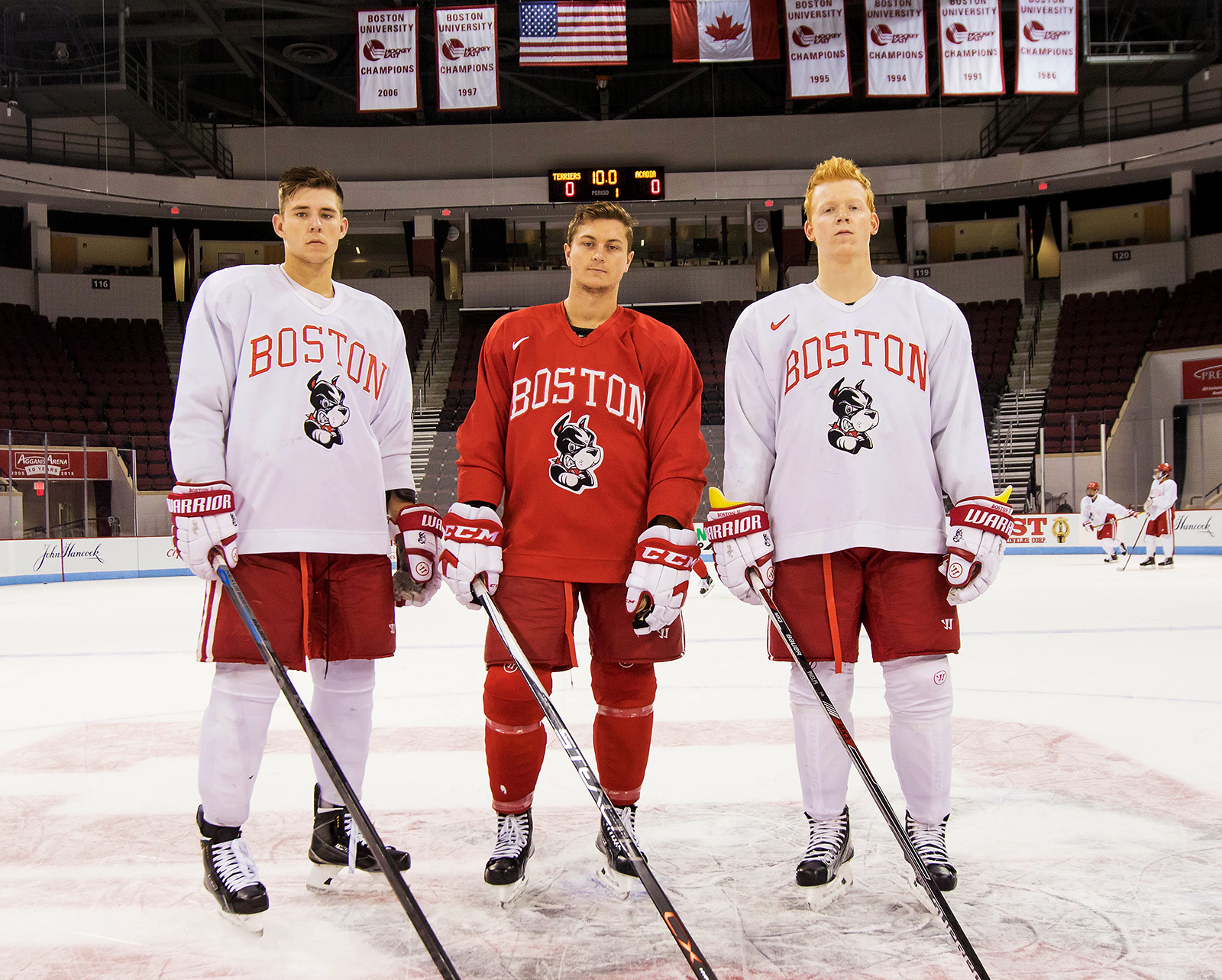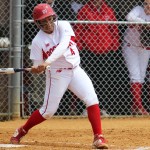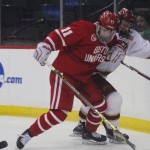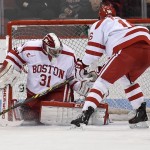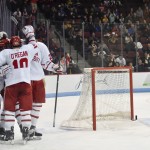[rawr]
[/rawr]
For head coach David Quinn and his staff, to get back to the Frozen Four, it’ll take incremental improvements in all facets of the game.
As obvious a statement as this is, it’ll be more difficult in practice than it is in theory. To return to the national title game, each of the returning players from last year’s squad — 18 in all — are expected to step up from where they were a season ago.
“We need last year’s freshmen to be better sophomores,” Quinn said. “We need last year’s sophomores to be better juniors. That’s what happened to us last year. All the guys coming back had better years than before, and that has to be the case this year.”
That means each class of players needs to do better not only from a statistical standpoint, but also in terms of maturity and leadership roles. That includes the Class of 2018 — the sophomores.
A group that once consisted of five forwards is now down to three.
Forward Jack Eichel, Hobey Baker winner, national leader in points and arguably the best freshman to ever play at Boston University, is no longer skating on Commonwealth Avenue. Drafted second overall in the 2015 NHL Entry Draft by the Buffalo Sabres, the gifted teenager signed a professional contract.
Eichel and his team-leading 71 points are gone.
While he recorded just four points in his first season in the scarlet and white, promising forward J.J. Piccinich is no longer a member of the team. A fourth-round pick of the Toronto Maple Leafs in 2014, Piccinich decided to leave college for major junior hockey, joining the London Knights of the Ontario Hockey League.
With those two departures, that leaves a trio of sophomore forwards — A.J. Greer, Nikolas Olsson and Chase Phelps. Last year, these three combined 22 points, not even a third of Eichel’s individual point total.
But, according to Quinn, these three have already shown progression in the few practices the team has had so far this season.
There’s confidence that these forwards are ready to make the leap.
A.J. Greer
Freshman year usually comes with a mix of success, learning experiences and inconsistencies. Adjusting to the college game with its faster pace and older players can be a tough change. In short, it’s a difficult time for most.
Add in being one of the youngest players in all of college hockey, and that’s what Greer had to deal with in his rookie season at BU. As one of the top performers at Kimball Union Academy, Greer accelerated through the prep school to join the Terriers a season early.
As a 17-year-old for most of the first half of the season, it wasn’t an easy adjustment for the 6-foot-3, 215-pound power forward. At times, this raw product displayed promise, but just couldn’t put it all together as he had when he notched 92 points in 61 career games at Kimball Union.
“I think it’s a different game, going from prep school to college,” Greer said. “And taking that role from prep school that I was as a scorer and a guy who people would rely on, to more of a role as a bottom-six guy and I had to fight my way up the lineup, which I had some ups and downs last year, [but] I didn’t attain the goal that I wanted to stats-wise.”
It took time, practices and some scratches from the lineup, but Greer got things going and seemed to catch his stride when the Terriers needed him most. He worked his way up the depth chart, joining BU’s second line during the postseason run. He wasn’t scoring at a prodigious rate, but the progress was there, and Greer’s true potential became apparent.
It all came together for him in the national semifinal game. In a play that swung the momentum, Greer blasted a one-timer that fooled University of North Dakota netminder Zane McIntyre and knocked his water bottle off its moorings.
“I think it was a long process and it went great at the end of the year,” Greer said. “I got my shot and I think I proved to everyone that I could at least impact the game a little.”
So after a strong end to the season, Greer trekked home to Quebec and worked his skating stride and speed — things he hopes make both him and the team better.
During the summer, Greer also lived out one of his lifelong dreams. When the Colorado Avalanche selected him in the second round of the NHL Draft, it was a culmination of what he’s worked for his entire life. A special moment for him and his family, yes, but Greer has his eyes set on what he can do this year to help out the Terriers.
“It was a dream come true when they called the 39th pick, it’s something I looked forward to for sure,” Greer said. “But I’m just kind of focusing on this year and winning a national title.
“I think I have a legit chance to show who I am as a leader and also have a bigger role on the ice as an impact player.”
Nikolas Olsson
While Greer had to learn the ropes of a new, faster, stronger game, Olsson, on the other hand, had an easier time adjusting to the college level.
Having played two seasons with the U.S. National Team Development Program and then two years with the Sioux City Musketeers of the USHL, Olsson felt better prepared for what it would take to play against the older competition in Hockey East.
Other than some injury issues early in the season, Olsson looked well-suited within BU’s system. He was second among the freshman forward group in points, using a combination of skill and power in front of the net to work around opposing defenses. He scored in some big moments as well, finishing with three points in two Beanpot games, while also notching a goal in the Hockey East Championship.
Along with his offensive skillset, Olsson continually provided a physical element to the game, throwing hits like a defenseman might.
So what does Olsson plan to do differently coming into his second year? Not much, actually.
“I kind of want to adapt a little bit bigger of a role and maybe contribute a little bit more, but whatever the team needs me to do,” Olsson said. “Hopefully [I’ll be] just an energetic forward who will make plays. I liked how I played last year, so I’m probably going to try to mimic that, maybe score a couple of more goals and a few more points and impose a little more skill.”
Quinn said Olsson is more than ready to have a more prominent role this year, just based on the way he’s looked thus far in practices and training. According to BU’s bench boss, Olsson is in “the best shape of his life,” so he’ll be ready to have that statistical jump this year.
Aside from the goals and the hits that Olsson wants to keep providing, he also made note of how he wants to be an example off the ice, especially for the newcomers. Being in their shoes last year, Olsson said the sophomores should be valuable teachers for this crop of rookies.
“I think that all of our sophomore forwards are going to try to provide an example for the freshmen coming,” Olsson said. “Just give them tips and just let them know things we may have done last year to succeed in our freshman year early on.”
Coming so close in their first year to a national title but just having it slip away is enough motivation in itself for Olsson and this sophomore group. The talent is in place, now it’s just a matter of execution to reach the final pinnacle.
“We’re obviously coming back a lot hungrier than last year,” Olsson said. “We had a little taste of it, but we didn’t get what we wanted, obviously. We’re coming back and we know our potential.”
Chase Phelps
It wasn’t all about adjusting to the NCAA for Phelps.
Yes, the game was quicker and better than it was when he played at Shattuck-St. Mary’s. But moving from a prep school that has an enrollment just north of 400 to a school like BU that has more than 30 times that number of students was something Phelps had to first get used to.
Add in transitioning from a tiny town of 23,000 like Faribault, Minnesota, to a big city like Boston, and freshman year was a bit of a culture shock for Phelps.
“I went to school at Shattuck-St. Mary’s in Minnesota in a small town,” Phelps said. “Moving up to Boston, away from home, and I was kind of playing a whole new men’s game.”
And a new game it was. Phelps, playing on the fourth line for most of the season, recorded two goals and two assists, notching his first collegiate point a little over a month into the season.
This year, though, his coach has already noticed a change in his play that will potentially propel him forward.
“I can already see the difference in Phelps,” Quinn said. “Phelps is more confident, he’s much more sure of himself.”
And with that newfound confidence, Phelps, like his fellow sophomores, is also now vying for an increased role with the forward group this season. With some more ice time, Phelps feels he can contribute more to the offense.
“Personally, I just want to play well from top to bottom,” Phelps said. “Produce a little bit more than last year. And work on playing to my strengths and all aspects of the game. … I’d like to move up on the food chain a little bit and I’ll keep working toward that as the year goes.
“And whatever happens, happens.”
Better preparation, more confidence and improved awareness of what it takes to be successful is what this sophomore forward class has, according to Quinn.
They’re a year older and wiser, ready for the challenges that come with defending a Hockey East title. And while it might seem to be asking a lot out of a group of three young players to contribute so much to the team, they feel more than up to the task. After all, they’ve already played in big games.
And they’d like to do it again.
“It’ll definitely be a big adjustment, I think I’m ready for it, as well as the other sophomores,” Greer said. “We’re a really good group coming from a big year, and we know what it takes to get there.”
Andrew is one of the men's hockey beat writers for The Daily Free Press. He was Sports Editor during the Spring 2014 semester and has also interned with NESN, WEEI.com and SportsNet New York. Follow him on Twitter at @squidthoughts for sports-related tweets and random quotes from "The Office," or you can contact him via email at arbattif@bu.edu.

